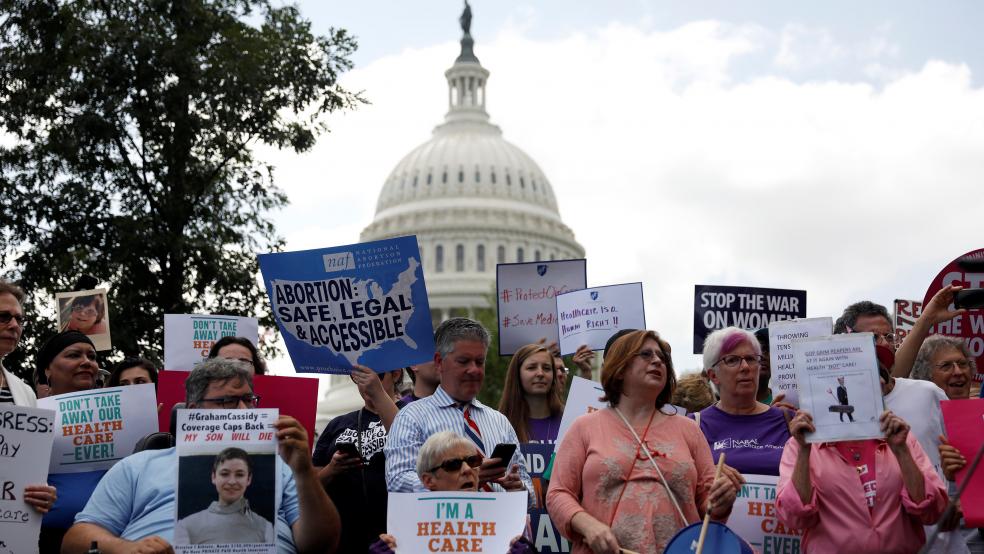In a move that poses a high degree of political risk, House Republican leaders are pressing for a vote on the American Health Care Act before Congress leaves town later this week on recess. If they succeed, members will be required to take a stand on a proposal to reshape one-fifth of the US economy without having had time to actually examine the final legislation and without a Congressional Budget Office assessment of what it would cost and what the impact on American consumers would be.
House Speaker Paul Ryan, with the backing of the White House, is asking the Republican members of the House to take a tremendous gamble on a bill that has very poor prospects for success in the Senate anyway.
Related: New Life for GOP Obamacare Replacement as a Key Lawmaker Switches Sides
The first two iterations of the AHCA were reviewed by the CBO, and the results were not good. The agency first determined that the proposal would result in 24 million fewer Americans with health care within 10 years, and that people between the ages of 50 and 65 would pay much, much more for it. An amended version slashed the bill’s savings to the federal budget in half, but still resulted in more than 21 million Americans without insurance.
Public opinion turned dramatically against the bill, and when President Trump and Ryan tried to orchestrate a vote in March, they were forced to cancel it when it became clear that they didn’t have the votes among House Republicans to pass it.
It is not clear exactly what a budget score of the new version of the bill will look like when CBO eventually gets a final version, but health care experts are already warning that it could be even worse than the earlier versions, in terms of how many people lose coverage. Changes meant to appease the most conservative members of the House would allow states to opt out of provisions meant to assure specific standards of care and accessibility.
Most notably, it would create the possibility that the millions of Americans with pre-existing conditions could be charged much more for their health coverage -- something that was explicitly banned by the Affordable Care Act.
Related: The White House Fires a Warning Shot on Obamacare, but Are They Firing Blanks?
A late change to the bill, adding $8 billion to help subsidize the premiums of people with pre-existing conditions was mocked as woefully inadequate by health care experts.
“The additional funding wouldn’t come remotely close to addressing the severe problems that the bill creates for people with pre-existing conditions,” wrote Aviva Aron-Dine, a senior fellow and senior counselor at the Center on Budget and Policy Priorities. “Notably, the $8 billion would restore less than 1 percent of the nearly $1 trillion the House bill cuts from programs that help people afford coverage.”
“None of the legislative tweaks under consideration changes the serious harm to patients and the health care delivery system if AHCA passes,” Dr. Andrew W. Gurman, president of the American Medical Association, said in a statement Wednesday. “Proposed changes to the bill tinker at the edges without remedying the fundamental failing of the bill – that millions of Americans will lose their health insurance as a direct result of this proposal.”
Given the dire predictions of the bill’s impact, and the angry public blowback that members of Congress faced the last time CBO analyzed a version of the AHCA, it is remarkable that House leadership is pressing its members to vote to pass the bill without a new CBO score. In the likely event that the CBO analysis shows a dramatic drop in coverage and increased rates for the sick, House Republicans who back the AHCA will have to own their “Yea” votes for the remainder of their political careers.
Related: Why Trump May Be Better Off With Another Obamacare Repeal Failure
Even more bizarre is that the general consensus is that the bill doesn’t have a chance of getting through the Senate. Even under the budget reconciliation rules that allow Republican to pass it with only 51 votes, the bill doesn’t currently appear to have the support it would need. And the kinds of changes that would be required to get it through the Senate would likely make it a dead letter when it returned to the House.
Of course, the political risk isn’t the only one Republicans are taking here. The decision to rewrite the way the entire healthcare system is supposed to operate, adding amendments on the fly and asking people to support it without examining it also puts the stability of the health care system at risk for tens of millions of Americans.
The standard pushback to this from Ryan and others is that the Affordable Care Act is in a “death spiral” and that acting now to replace it with the AHCA is the only option lawmakers have. But this narrative of a failing system was bluntly contradicted by the CBO last month, which said the system’s health care exchanges were stabilizing, not failing.
The rush to pass something that, in the unlikely event it becomes law, could do more harm than good to millions of Americans looks like an unsound strategy, whether you look at it through a purely political lens, or the lens of good public policy.





